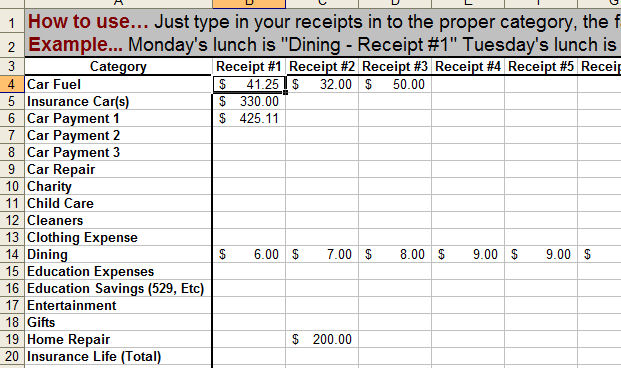How to keep track of money
Getting your family's
monthly bills organized and paid is a chore that everyone in America
goes through month after month. Ultimately a lot of families are also
trying to budget their monthly bills as well as just paying them. The
2007 -2011 recession has hit middle income families hard. Budgeting has
become a serious issue during this current recession. Middle income
families just don't and can't spend money like they used to.
How to keep track of money
is one of the very first steps that need to be taken if you are to get
your family's monthly bills under control. Modern middle income families
don't carry a lot of cash on them; today's family is more likely to have
bank debit cards and their favorite "rewards" credit card to make
purchases.
This move towards plastic has brought
very good tracking mechanisms that try to help you keep an eye on your
money. Unlike cash that you need to keep a receipt to know where the
money has gone, plastic immediately records exactly what was spent and
where.
Lovely except....
Keeping track of money has
gotten harder since we moved from cash to plastic simply for the fact
there are more ways to pay for everyday items. Now instead of reaching
into your wallet and paying for your meal at Subway you use your debit
card, when you go to J.C.Penney's you use your Penney's card. So at the
end of the month you have bills coming at you from at least 10 different
directions. It becomes real easy to loose track of the money.
Here are a couple of rules
to follow when trying to keep track of your money:
- Keeping track of money is all about creating a
record of the purchase, and being able to decipher what that
purchase was when you sit down to categorize and calculate your
monthly bills on a
family budget worksheet or a software program like Quicken
or Peachtree.
- Carry one main form of payment with you. Your
bank's debit card is the obvious choice but if you want to use a
credit card that gives you "rewards" then that will be fine. Cash is
also fine however if you choose the cash method you will need to also
keep all of the receipts.
- Don't worry if when you hear "debit" or "credit"
from your local merchant. The only difference for you is when the
money "posts" or comes out of your account. A debit charge
will post immediately a credit charge will normally post the very
next day. I typically ask the merchant which is cheaper for them
debit or credit since they are paying fees.
- Stop using store credit cards. In our BillsOnly
opinion, in the beginning moments of getting your family's monthly
bills under control, it is far more important to know how much is being
spent vs. getting an additional 10% off for using that particular
credit card.
- Carry one check in your wallet for an emergency.
I can't tell you how many times I have tried to purchase something
and the credit card machine is down. If you don't have cash write a
check.
- The cash in your wallet is for emergencies
as well. Don't pay for that lunch with cash, use your main form of
payment. I know this sounds counter productive to budgeting and
spending only what you have, but right now your family's monthly
bills are out of control and you need to learn how to keep track of
the money you have or think you have.
- Try to group purchases together. Example if you
are buying a $20 birthday present for someone don't add that $20
shirt that you need to this particular charge. Buy the present then
buy the shirt. Don't purchase them together. When you finally get
around to categorizing all of your monthly purchases it will look
like you bought a $40 present when it really was only $20.
All of the rules
above are just meant to help you quickly retrieve a record from your
online bank statement or from your main credit card. The object is
that 90% of all of your monthly charges show up in one place. That
is why BillsOnly prefers debit cards vs. credit cards. Debit cards
show up in your bank statement which is just flat out easier to find.
Now that we know
where we can locate what we spent during the month the next step is
to use some form of a family budget worksheet to keep track of the
money. This is actually the simple part. The staff at BillsOnly
still likes software programs that download the date from the bank
statement but we realize that not everyone wants to keep up with
another program. We created a free family budget sheet
to help you
with this.
Here's How:
1) Just place your
receipts into each months "entry tab at the bottom of the family
budget sheet. Each month has both a total tab and bill entry tab.
Click on the tab.

Start entering in the
information by receipts. The spreadsheet will do all of the math for
you.

Finally, if you enter
all of the information into the monthly entry tabs our family budget
sheet will not only calculate monthly bills it will also roll up to
total yearly bills and average bills per month as well.
Use a family budget
sheet to keep track of your money. Here is our new advance worksheet
ready to be downloaded in an excel format.
Click here for the advanced
family budget sheet.
|